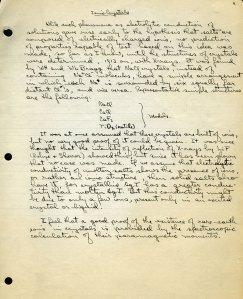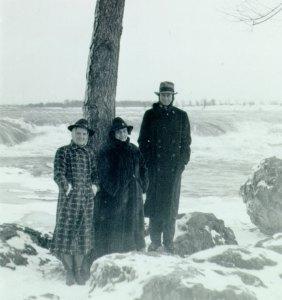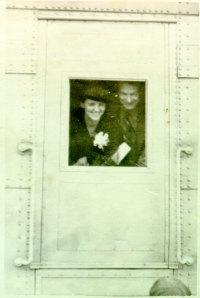
Segment of Pauling’s draft manuscript for The Nature of the Chemical Bond, ca. 1937.
[Celebrating the 75th anniversary of the Nature of the Chemical Bond. Part 3 of 6.]
While Linus Pauling, temporarily settled at Cornell as George Fischer Baker Lecturer, used his absence from his family to fuel his work and writing, he also ran into several obstacles and courted various diversions. An early obstacle came by way of his left wrist. Not long after Ava Helen left, Pauling’s letters home begin to describe mounting soreness in the wrist. On November 11, 1937, Pauling’s main Cornell contact, Jacob Papish, intervened directly by calling a doctor “who said (without looking) for me to get it baked out at the hospital with a short-wave apparatus and bandaged. This was done.”
Pauling was not too impressed – later in the day he reported “I am carrying my arm in a sling – it hurts when I use it, and I find myself using it if it is free. I think it will be well soon, though. If it isn’t I’ll go to a doctor – not Papish’s.” From the sounds of it though, the treatments started to work. By the fifteenth Pauling told his wife that “it still hurts, but only once in a while, and I can use my hand if I am careful.” But a few days later his voluminous writing began to catch up with him as he began experiencing cramps in his right hand and developed a callous on his pinky finger. By the 24th, with most of his wrist pains behind him, Pauling finally remembered how he had hurt himself in the first place, recalling that he was “at Maury’s office” and “fell over backward in his chair – flat on the floor – and I’m sure that I fell on my wrist. Isn’t it strange that I forgot that? I’m rather tired of writing.”
Pauling also found a few diversions to break up his otherwise relentless pace of writing and lecturing while at Cornell. For one, he took advantage of the opportunity to sit in on various campus lectures. On November 11, for example, Pauling “listened to a long talk” that was “rather boring” but still boasting an interesting point or two – on the sweet-potato starch industry.” Pauling also engaged in some reading, including Edwin C. Kemble’s The Fundamental Principles of Quantum Mechanics with Elementary Applications. He likewise found time to read for pleasure, most commonly the Sunday paper and Time magazine. He included a bit of space for fiction, including two short stories by Thomas Mann and Christopher Morley’s The Trojan Horse, which he found “very amusing” and useful for “put[ting] me in the mood (Liny’s word) for sleep.” Alas, the technique didn’t work too well, because the next day a weary Pauling wrote to Ava Helen that he was going home early to finish the book and go straight to bed.
These diversions, it would seem, were not enough to slake Pauling’s loneliness and he continued to seek out ways to be together with Ava Helen. At Thanksgiving Pauling wrote to his wife,
I am working hard now so that if you do come back with me in January I’ll have more time to play with you. We would have fun going to Princeton and Yale (also Buffalo – we would go to Niagara Falls again). I liked having you in the Lab. with me, but I did get worried about you, thinking that you were bored while I was trying to work. If you come back with me I’ll work in my/our room and you can read or go to bed. We used to do that in Munich. You have forgotten what it is like to have Paddy with you working.
Though Ava Helen initially protested the idea of going back to Ithaca, she gradually warmed to the suggestion. For it to happen, they needed their helper Lola Cook to take care of the four Pauling children, including Crellin, still an infant. This may not have been too difficult to arrange since Ava Helen had told Linus earlier, on November 11th, that Lola “said she wants to take care of the baby!” On December 2, Ava Helen wrote, “I’d leave Lola with the baby I think and get someone to do the work. I’m hoping that after three weeks at home you will want to return to Ithaca alone. That would be simpler and less expensive.” Those three weeks, as it turned out, were not enough, and Ava Helen returned to upstate New York with her husband in January.

The Paulings and Yvonne Handy at Niagara Falls, January 1938.
As the time came closer for him to return to Pasadena for the Christmas holiday, Pauling began to run out of steam. On December 3rd, he told Ava Helen, “I’m afraid that I’m getting stale – I’ve written only a few pages today.” A few days later he repeated how “stale” he had become, telling his wife, “I need you to play with me and love me and make me happy again.” Ava Helen responded the same day, though presumably to his December 3rd letter, telling him, “Of course you can’t write more on your book because you’ve worn yourself out.” Luckily for Pauling, his plan to make a quick exit from Cornell for the winter break was successful and he was on his way home in early December. Riding the train back to Pasadena, Pauling continued to work on his book, telling Ava Helen, “I haven’t anything to read” and, as a result, had “been planning out the last chapters of the book.”
Once Linus and Ava Helen were back together, first in Pasadena and later in Ithaca, progress on The Nature of the Chemical Bond slowed considerably – it would take several months to match the productivity of Pauling’s one month alone at Cornell, during which time he had written half of his book. On February 10, 1938, Pauling, now back in Pasadena for good, wrote to Papsish at Cornell to let him know that he had just received his manuscript by mail and “shall now settle down to work on it with the hope of completing it before long.” Over a month later, on March 18, Pauling told his Caltech colleague Eddie Hughes, who had stayed at Cornell to help push the book through the university’s press, “I haven’t done very much toward completing the chemical bond book, but I hope to get to work on it soon.” The following month, when Pauling was away from Ava Helen again, he told her that he was working on the book “for a while (correcting old chapters).”

Ava Helen and Linus peeking through a train window, Spring 1938.
By May contacts at Cornell were inquiring into the whereabouts of Pauling’s book, but the author still had one chapter left to write. On May 10 he told Hughes, “I am indeed anxious to get my book finished, but I am having trouble in finding time to work on it.” Pauling decided to begin sending it in sections and told Hughes that he would finish it by the end of June, at which point Hughes could make his way back to Pasadena.
While he had not yet begun sending the manuscript to Cornell, Pauling resumed his correspondence with Papish to discuss a second edition; according to Pauling, “the field is progressing so rapidly…[a second edition] probably should be prepared in about two years.” A month later Pauling began sending chapters one-by-one, telling Hughes that he was mostly finished “except for two or three odd sections” and “some of the figures.” Pauling would find that his delay in getting a final manuscript to Cornell would only cause trouble and interfere with his plans to use the book in his classroom the following year.
